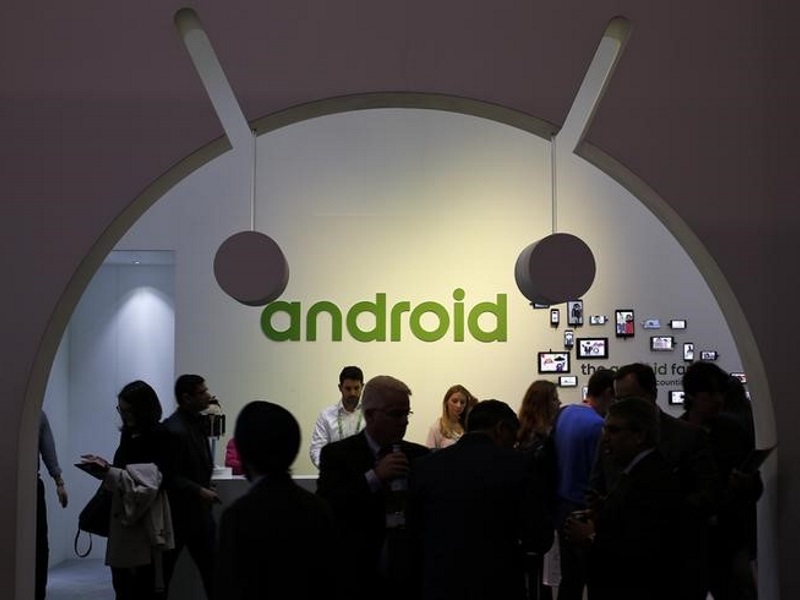- Home
- Mobiles
- Mobiles News
- European Union Charges Google With Abusing Its Android Dominance
European Union Charges Google With Abusing Its Android Dominance

EU antitrust regulators said that by requiring mobile phone manufacturers to pre-install Google Search and the Google Chrome browser to get access to other Google apps, the U.S. company was harming consumers by stifling competition.
The EU's move is the latest in a series of anti-trust challenges Google has faced in both the EU and countries including India, Brazil and Russia. US regulators closed their most recent investigation of the company in 2013 without taking action.
The European Commission said Google's Android licensing practices, which started in 2011 when the company became dominant in mobile operating systems and app stores, showed Google was seeking to shield its search engine, the world's most popular, from competition.
Google is already facing EU charges over the promotion of its shopping service in Internet searches at the expense of rival services in a case that has dragged on since late 2010 despite three attempts to resolve the issues.
The stakes are higher for Google in the Android case as it made about $11 billion (roughly Rs. 72,875 crores) last year from advertising sales on Android phones through its apps such as Maps, Search and Gmail, according to estimates by financial analyst Richard Windsor.
"A competitive mobile Internet sector is increasingly important for consumers and businesses in Europe," European Competition Commissioner Margrethe Vestager said in a statement.
"We believe that Google's behaviour denies consumers a wider choice of mobile apps and services and stands in the way of innovation by other players," she said.
The European Commission said about 80 percent of smart mobile devices in Europe and the world run on Android and that Google holds more than 90 percent of the market for general Internet searches on Android in the European Economic Area.
Wall Street analysts were sanguine about the financial consequences of the EU's action.
"In the near-term, we do not believe there will be any material financial impact," Mark Mahaney, a prominent Internet analyst with RBC Capital Markets, said in a research note.
He added that there could be a material impact down the line as the case moved forward, but that it was "almost impossible" to gauge the likelihood of the company being forced to change its business practices.
Still, Mahaney noted that regulatory risk was "something of a 'permanent' investment risk" for Google. And there were some signs Tuesday that the EU's action could help rekindle antitrust investigations in the United Sates - potentially an even bigger threat.
Senator Richard Blumenthal, a Connecticut Democrat, said he hoped the action by European regulators prompts the Federal Trade Commission to take a close second look at whether Google is deserving of antitrust scrutiny in the United States.
Financial incentives
Google, which has 12 weeks to respond to the EU charges, said Android was a remarkable system based on open-source software and open innovation.
"We look forward to working with the European Commission to demonstrate that Android is good for competition and good for consumers," Google's general counsel, Kent Walker, said in a blog.
He said any phone maker could load Google apps and rival products and that users had freedom of choice as well.
Complainant FairSearch said Google was hindering the development of versions that might lead to new operating systems able to compete with Android, despite launching it as an open source project.
The Commission said while Android was an open source system that could be used to develop new mobile operating systems - known as Android forks - Google required phone manufacturers to sign an agreement not to sell devices running on such forks if they wanted to pre-install Google apps.
The EU also charged Google with giving "significant financial incentives" to some of the world's largest smartphone makers to pre-install Google Search exclusively on devices.
Mozilla, which develops the Firefox browser, said in a statement: "This behaviour ... is one of the reasons why launching competitive products like Firefox for mobile and Firefox OS is challenging. We see substantial value in removing barriers to entry so competition and innovation can flourish."
Internet Explorer-browser maker Microsoft Corp declined to comment. Norway's Opera Software could not immediately be reached for comment.
Vodafone, BT Group's EE, Orange, Deutsche Telekom, KPN, Samsung Electronics and LG Electronics were not immediately available to comment. Huawei declined to comment.
© Thomson Reuters 2016
Catch the latest from the Consumer Electronics Show on Gadgets 360, at our CES 2026 hub.
Related Stories
- Samsung Galaxy Unpacked 2025
- ChatGPT
- Redmi Note 14 Pro+
- iPhone 16
- Apple Vision Pro
- Oneplus 12
- OnePlus Nord CE 3 Lite 5G
- iPhone 13
- Xiaomi 14 Pro
- Oppo Find N3
- Tecno Spark Go (2023)
- Realme V30
- Best Phones Under 25000
- Samsung Galaxy S24 Series
- Cryptocurrency
- iQoo 12
- Samsung Galaxy S24 Ultra
- Giottus
- Samsung Galaxy Z Flip 5
- Apple 'Scary Fast'
- Housefull 5
- GoPro Hero 12 Black Review
- Invincible Season 2
- JioGlass
- HD Ready TV
- Laptop Under 50000
- Smartwatch Under 10000
- Latest Mobile Phones
- Compare Phones
- Honor Magic 8 RSR Porsche Design
- Honor Magic 8 Pro Air
- Infinix Note Edge
- Lava Blaze Duo 3
- Tecno Spark Go 3
- iQOO Z11 Turbo
- OPPO A6c
- Samsung Galaxy A07 5G
- Lenovo Yoga Slim 7x (2025)
- Lenovo Yoga Slim 7a
- Lenovo Idea Tab Plus
- Realme Pad 3
- Moto Watch
- Garmin Quatix 8 Pro
- Haier H5E Series
- Acerpure Nitro Z Series 100-inch QLED TV
- Asus ROG Ally
- Nintendo Switch Lite
- Haier 1.6 Ton 5 Star Inverter Split AC (HSU19G-MZAID5BN-INV)
- Haier 1.6 Ton 5 Star Inverter Split AC (HSU19G-MZAIM5BN-INV)







![[Sponsored] Haier C90 OLED TV | Dolby Vision IQ, 144Hz OLED and Google TV in Action](https://www.gadgets360.com/static/mobile/images/spacer.png)









